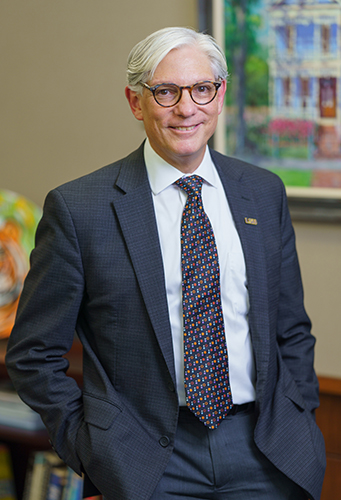
Richard DiCarlo, MD
Dean, LSUHSC
School of Medicine
Dear Visitors:
Welcome to the LSU Health New Orleans School of Medicine. The school was founded in 1931 with a dual mission of training outstanding doctors who are committed to care for the underserved and providing excellent healthcare for the people of Louisiana. What began as a small School of Medicine has now grown into a major Health Sciences Center with five other schools (Dentistry, Nursing, Allied Health, Public Health and Graduate Studies), but our commitment to excellence in patient care and service to our community continues today. Our faculty, residents and students also work to advance medical science - whether making exciting discoveries in the laboratory, studying new treatments in our clinics, or understanding how our delivery system can improve health equity. I encourage you to take a closer look at our school. I believe you will find what you seek in your education and training.
Whether you come to LSU Health New Orleans for medical school or residency, you will learn to be an outstanding physician. We have a rich history of medical education that dates to the historic 2000-bed Charity Hospital. We have replaced Charity with a new University Medical Center, New Orleans. This 1.5 million square foot hospital won architectural recognition for its use of natural light, custom artwork, and integration of outdoor spaces. Its very design enhances comfort, healing and dignity for our patients, and it serves as our primary teaching hospital for adult care. Our outstanding faculty will help you become a physician who practices with compassion, depth of knowledge, critical thinking, and technical proficiency. You will also learn the practice of medicine within the social context of community needs and you will learn the importance of providing excellent care for all, including underserved populations.
The medical school curriculum integrates clinical and basic science teaching from day one. Skills training in our Student Learning Center and Center for Advance Practice simulation labs also begins early in the first year. Our health equity curriculum will challenge you to understand the roots of health disparities and inspire you to find solutions. Interested students have opportunities to explore those challenges on a deeper level and gain real-world experience in health policy. Our students may do their third and fourth-year clinical rotations in New Orleans, or at regional campuses in Baton Rouge and Lafayette. All are outstanding learning environments with dedicated teachers, a diverse patient population, and a wide range of disease conditions from which to learn.
We have over 900 residents and fellows in over 65 different accredited programs. Our residents train at a broad range of hospitals in New Orleans and across the southern regions of the State. This diversity of academic and community-based training sites provides a rich learning experience, and our residents treat patients from all walks of life. All training programs utilize our simulation centers for skills training, and residents have access to state-of-the art CME courses that teach the latest innovations in patient care and surgical procedures. We have been leaders in simulation for more than 20 years, and our recently opened CALS building (Center for Advanced Learning and Simulation) expands our simulation capacity. This $65,000,000 project will allow us to develop innovative programs in mass trauma simulation, doctor-patient communication, robotics, and other advanced training. I invite you to come to our campus and see this new showcase of the school’s facilities.
With twenty-three Departments and four Centers of Excellence, our learners can contribute to exciting advances in medical science, both in the laboratory and in the clinic. We have recruited and developed great investigators in cancer, neuroscience, addiction, cardiovascular disease and many other areas of basic research. Our clinical faculty are making advances in the management of cancer patients, burn and trauma victims, and those with many other pulmonary, cardiovascular, neurological, gastrointestinal, infectious and immunologic diseases. LSU Health faculty are working at all levels to improve the delivery of patient care and the quality of life for the people of Louisiana. In December 2025, we plan to open nearly 200,000 square feet of newly renovated laboratory space on the top floors of the Medical Education Building (MEB). We will have the best laboratory space in the State, and this $100,000,000 project will position our research enterprise for success over the next 20 years.
On behalf of our physicians, teachers, and researchers, I welcome you and thank you for your interest in LSU Health School of Medicine in New Orleans. Our core values are excellence, service, innovation, compassion, integrity, and inclusivity. We strive to live up to those values in everything we do.
Richard DiCarlo, MD
Dean, LSUHSC School of Medicine
